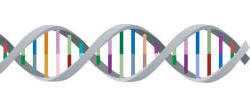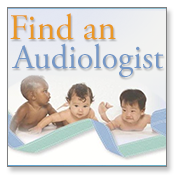Genetics of Hearing Loss

Hearing loss has many causes. 50% to 60% of hearing loss in babies is due to genetic causes. There are also a number of things in the environment that can cause hearing loss. 25% or more of hearing loss in babies is due to “environmental” causes such as maternal infections during pregnancy and complications after birth. Sometimes both genes and environment work together to cause hearing loss. For example, there are some medicines that can cause hearing loss, but only in people who have certain mutations in their genes.
Genes contain the instructions that tell the cells of people’s bodies how to grow and work. For example, the instructions in genes control what color a person’s eyes will be. There are many genes that are involved in hearing. Sometimes, a gene does not form in the expected manner. This is called a mutation. Some mutations run in families and others do not. If more than one person in a family has hearing loss, it is said to be “familial”. That is, it runs in the family. If only one person in the family has hearing loss, it is called “sporadic”. That is, it does not run in the family.
About 70% of all mutations causing hearing loss are non-syndromic. This means that the person does not have any other symptoms. About 30% of the mutations causing hearing loss are syndromic. This means that the person has other symptoms besides hearing loss. For example, some people with hearing loss are also blind.
The cochlea (the part of the ear that changes sounds in the air into nerve signals to the brain) is a very complex and specialized part of the body that needs many instructions to guide its development and function. These instructions come from genes. Changes in any one of these genes can result in hearing loss. The GJB2 gene is one of the genes that contains the instructions for a protein called connexin 26; this protein plays an important role in the functioning of the cochlea. In some populations about 40% of newborns with a genetic hearing loss who do not have a syndrome, have a mutation in the GJB2 gene.
For more information: http://www.cdc.gov/ncbddd/hearingloss/freematerials/ParentsGuide508.pdf [PDF – 4M] .
- Page last reviewed: February 18, 2015
- Page last updated: February 18, 2015
- Content source:



 ShareCompartir
ShareCompartir